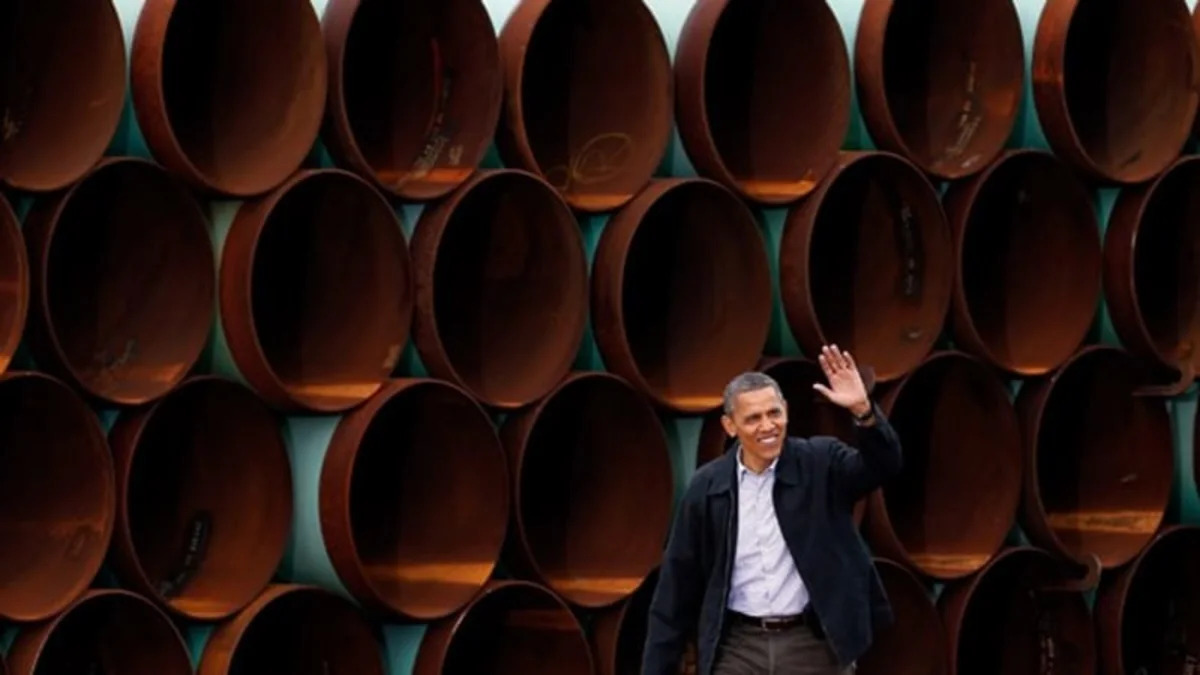It has always been the habit of the party that doesn't occupy the White House to blame various ills on the party that does. Especially in the past few years when it has come to gas prices, the party-in-waiting has blamed the POTUS for "pain at the pump." We're not taking sides here – Republicans are doing it to Obama now, just like Democrats did it to Bush. Unfortunately for their arguments, the President has about as much control over the price of oil as he does over the price of bread; if you saw what it took to get either to the retail outlet, the enormity of intricacies would make it plain.
Case in point: In 2008, the U.S. began exporting oil products like gas and diesel for the first time in decades and, according to a report in Fortune, even though the U.S. is producing more oil than any time in the past eight years, the price of gas is still high. Part of the issue is the bottleneck in transportation: Two pipelines carry the black gold to the nation's major clearinghouse for oil in Cushing, Oklahoma, where the president can be seen in the image above, and there aren't enough pipelines to get it from there to refiners. One analyst called Cushing "the 'Roach Motel' for crude" because it could get in but not really get out.
On top of this, domestic gas demand has dropped. That has added to the glut of oil awaiting shipment, which drove down the price of our own benchmark oil, West Texas Intermediate (WTI), by double digits compared to its European counterpart, Brent crude. Obviously, oil-market traders – whose contracts set the price for oil – couldn't let that continue, so they essentially walked away from WTI, a move that had the effect of setting the benchmark price at the higher Brent crude price. Put simply, they asked "Why sell a cheap commodity when I can sell the same commodity for more money?" And as we know, more expensive oil means more expensive gasoline.
That's the gist, but naturally this is a huge simplification. For instance, there are more than 100 kinds of oil traded on the markets and we've only mentioned two, and middlemen between drillers and the gas station can number in the dozens. But the point is that when you want to know what's up with gas prices, don't look at toward the White House – no matter who is in office – look at traders who will work to get the best prices they can, at refiners who can idle facilities to support prices and at the minutiae of production. The U.S. doesn't even own the oil drilled here – companies purchase drilling rights from the government and the oil they find belongs to them; they can sell it to anyone anywhere. Once they get it out of Cushing, that is. And if you think the much disputed Keystone Pipeline might help, some analysts believe it will make the price of oil rise.
Case in point: In 2008, the U.S. began exporting oil products like gas and diesel for the first time in decades and, according to a report in Fortune, even though the U.S. is producing more oil than any time in the past eight years, the price of gas is still high. Part of the issue is the bottleneck in transportation: Two pipelines carry the black gold to the nation's major clearinghouse for oil in Cushing, Oklahoma, where the president can be seen in the image above, and there aren't enough pipelines to get it from there to refiners. One analyst called Cushing "the 'Roach Motel' for crude" because it could get in but not really get out.
On top of this, domestic gas demand has dropped. That has added to the glut of oil awaiting shipment, which drove down the price of our own benchmark oil, West Texas Intermediate (WTI), by double digits compared to its European counterpart, Brent crude. Obviously, oil-market traders – whose contracts set the price for oil – couldn't let that continue, so they essentially walked away from WTI, a move that had the effect of setting the benchmark price at the higher Brent crude price. Put simply, they asked "Why sell a cheap commodity when I can sell the same commodity for more money?" And as we know, more expensive oil means more expensive gasoline.
That's the gist, but naturally this is a huge simplification. For instance, there are more than 100 kinds of oil traded on the markets and we've only mentioned two, and middlemen between drillers and the gas station can number in the dozens. But the point is that when you want to know what's up with gas prices, don't look at toward the White House – no matter who is in office – look at traders who will work to get the best prices they can, at refiners who can idle facilities to support prices and at the minutiae of production. The U.S. doesn't even own the oil drilled here – companies purchase drilling rights from the government and the oil they find belongs to them; they can sell it to anyone anywhere. Once they get it out of Cushing, that is. And if you think the much disputed Keystone Pipeline might help, some analysts believe it will make the price of oil rise.


Sign in to post
Please sign in to leave a comment.
Continue